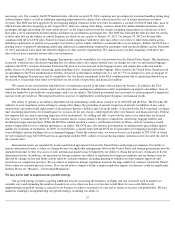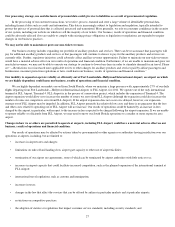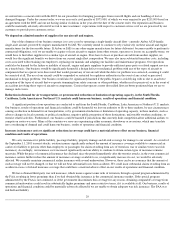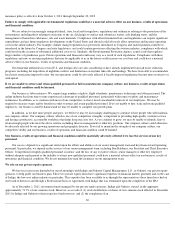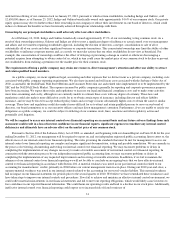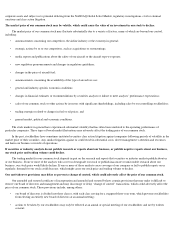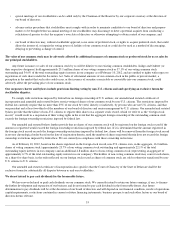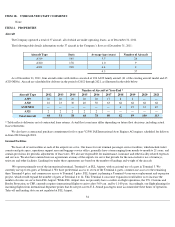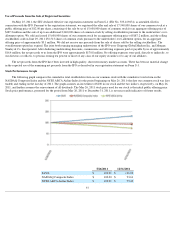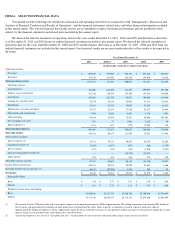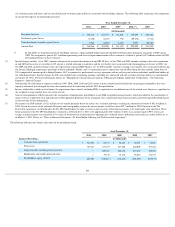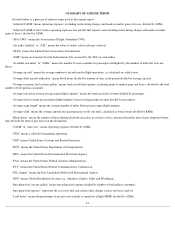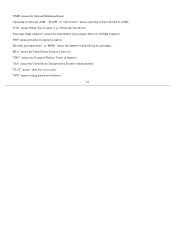Spirit Airlines 2011 Annual Report Download - page 39
Download and view the complete annual report
Please find page 39 of the 2011 Spirit Airlines annual report below. You can navigate through the pages in the report by either clicking on the pages listed below, or by using the keyword search tool below to find specific information within the annual report.
The value of our common stock may be adversely affected by additional issuances of common stock or preferred stock by us or sales by
our principal stockholders.
Any future issuances or sales of our common stock by us will be dilutive to our existing common stockholders. Indigo and Oaktree (or
their respective designees) hold approximately 25.1 million shares of our voting common stock or 37.1% of our voting common stock
outstanding and 34.6% of the total outstanding equity interests in our company as of February 10, 2012, and are entitled to rights with respect to
registration of such shares under the Securities Act. Sales of substantial amounts of our common stock in the public or private market, a
perception in the market that such sales could occur, or the issuance of securities exercisable or convertible into our common stock, could
adversely affect the prevailing price of our common stock.
Our corporate charter and bylaws include provisions limiting voting by non-U.S. citizens and and specifying an exclusive forum for
stockholder disputes.
To comply with restrictions imposed by federal law on foreign ownership of U.S. airlines, our amended and restated certificate of
incorporation and amended and restated bylaws restrict voting of shares of our common stock by non-U.S. citizens. The restrictions imposed by
federal law currently require that no more than 25% of our stock be voted, directly or indirectly, by persons who are not U.S. citizens, and that
our president and at least two-
thirds of the members of our board of directors and senior management be U.S. citizens. Our amended and restated
bylaws provide that the failure of non-U.S. citizens to register their shares on a separate stock record, which we refer to as the “foreign stock
record,” would result in a suspension of their voting rights in the event that the aggregate foreign ownership of the outstanding common stock
exceeds the foreign ownership restrictions imposed by federal law.
Our amended and restated bylaws further provide that no shares of our common stock will be registered on the foreign stock record if the
amount so registered would exceed the foreign ownership restrictions imposed by federal law. If it is determined that the amount registered in
the foreign stock record exceeds the foreign ownership restrictions imposed by federal law, shares will be removed from the foreign stock record
in reverse chronological order based on the date of registration therein, until the number of shares registered therein does not exceed the foreign
ownership restrictions imposed by federal law. We are currently in compliance with these ownership restrictions.
As of February 10, 2012, based on the shares registered on the foreign stock record, non-U.S. citizens own, in the aggregate, 16.0 million
shares of voting common stock (approximately 23.7% of our voting common stock outstanding and approximately 22.1% of the total
outstanding equity interests in our company) and an additional 4.8 million shares of non-voting common stock (representing an aggregate of
approximately 6.7% of the total outstanding equity interests in our company). The holders of non-
voting common stock may convert such shares,
on a share-for-share basis, in the order reflected on our foreign stock record as shares of common stock are sold or otherwise transferred by non-
U.S. citizens to U.S. citizens .
Our amended and restated certificate of incorporation also specifies that the Court of Chancery of the State of Delaware shall be the
exclusive forum for substantially all disputes between us and our stockholders.
We do not intend to pay cash dividends for the foreseeable future.
We have never declared or paid cash dividends on our common stock. We currently intend to retain our future earnings, if any, to finance
the further development and expansion of our business and do not intend to pay cash dividends in the foreseeable future. Any future
determination to pay dividends will be at the discretion of our board of directors and will depend on our financial condition, results of operations,
capital requirements, restrictions contained in current or future financing instruments, business prospects and such other factors as our board of
directors deems relevant.
33
• special meetings of our stockholders can be called only by the Chairman of the Board or by our corporate secretary at the direction of
our board of directors;
• advance notice procedures that stockholders must comply with in order to nominate candidates to our board of directors and propose
matters to be brought before an annual meeting of our stockholders may discourage or deter a potential acquirer from conducting a
solicitation of proxies to elect the acquirer’s own slate of directors or otherwise attempting to obtain control of our company; and
• our board of directors may, without stockholder approval, issue series of preferred stock, or rights to acquire preferred stock, that could
dilute the interest of, or impair the voting power of, holders of our common stock or could also be used as a method of discouraging,
delaying or preventing a change of control.


